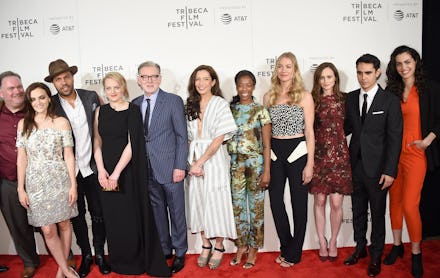'The Handmaid's Tale' cast says story isn't feminist, unwittingly defines feminism

The women of Hulu's Handmaid's Tale sure are frightened of the F word. At an advance screening of the series' first episode on Friday, cast members were asked whether or not the central story is feminist. Their responses betrayed a fundamental misunderstanding of what feminism actually is.
"I think that any story, if it is a story being told by a strong, powerful woman... any story that's just a powerful woman owning herself in any way is automatically deemed 'feminist,'" Madeline Brewer, who plays Janine, mused. "But it's just a story about a woman. I don't think that this is any sort of feminist propaganda. I think that it's a story about women and about humans... This story affects all people."
For those unfamiliar with its plot, Margaret Atwood's The Handmaid's Tale depicts a dystopia in which women are stripped of their bodily autonomy and relegated to the status of walking wombs. Selecting it as the May/June pick for her feminist book club, Emma Watson described the read as "a book that has never stopped fascinating readers because it articulates so vividly what it feels like for a woman to lose power over her own body" — which, in the age of Donald Trump's presidency, is frighteningly resonant.
As BuzzFeed's Anne Helen Petersen pointed out, Atwood's story has been billed as a "feminist 1984" because it deals with women basically existing for and at male whims. Feminism is nothing more or less complex than the belief that women should have the same rights men do — which is to say: human equality regardless of gender. Interestingly enough, that's more or less the argument the Hulu show's lead, Elizabeth Moss, emphasized in her response, borrowing from a famously feminist Hillary Clinton line.
"For me, [The Handmaid's Tale is] not a feminist story," Moss, who plays Offred, told the audience. "It's a human story because women's rights are human rights. So, for me it's — I never intended to play Peggy [Moss' Mad Men character] as a feminist. I never intended to play Offred as a feminist. They're women, and they're humans."
Atwood would agree to disagree. After Trump's election, she put her book in a new context for the New York Times, specifically addressing the question of whether The Handmaid's Tale is a feminist text:
If you mean an ideological tract in which all women are angels and/or so victimized they are incapable of moral choice, no. If you mean a novel in which women are human beings — with all the variety of character and behavior that implies — and are also interesting and important, and what happens to them is crucial to the theme, structure and plot of the book, then yes. In that sense, many books are "feminist."
Feminism doesn't just concern itself with "women," feminism is about the fight for basic human rights for women. That relatively common misconception might be a side effect of feminism's journey into mainstream culture: More people might be familiar with the word, but that doesn't mean they know how to use it correctly in a sentence.
Women's rights are still considered "fringe," which might explain why some women still balk at the feminist label even as they espouse feminist views — which, in Moss' case, are basically a synopsis of a famous Marie Shear quote: "Feminism is the radical notion that women are people."